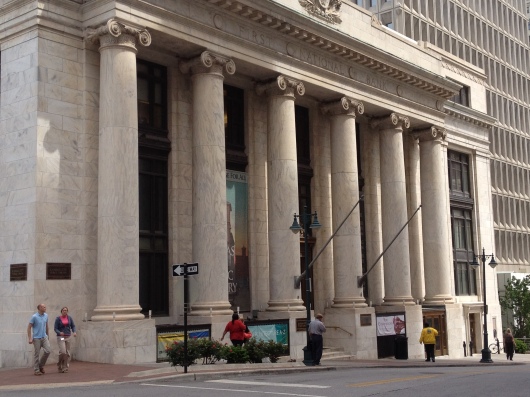The Kansas City Public Library is one of my favorite places. While it is an incredible building on the outside, it is what happens inside the building that makes it so special. The library provides for Kansas City the kind of educational opportunities I imagine were available in the times of Socrates. It is a place to read, study and share ideas; not for glory, grades or a degree, but for the sheer love of learning.
Last night’s lecture by James B. Steele, co-author of The Betrayal of the American Dream, presented the library at its best. The seating areas on the first and second floors of the library were packed. The audience, while diverse by any standard, included a significant number of bankers, academics, reporters, and business and civic leaders of both political parties. I could barely see Mr. Steele from my seat behind the second floor bannister. Despite the inconvenient seating arrangements, no one left. The audience listened with rapt attention as Steele spoke for 40 minutes and took questions for another 40 minutes.
Steele is a native of Kansas, and a graduate of UMKC, so he is a “hometown success”. He began his career with the Kansas City Times before moving to the national arena. An author and long time investigative journalist, he and his long time collaborator, Donald L. Bartlett have won two Pulitzer Prizes, in addition to other notable awards. The book, American: What Went wrong?, a No. 1 New York Times bestseller, is one of the seven books earlier books they co-authored.
Mr. Steele is a gracious and kindly gentleman, but was quite compelling in his description of the current state of U.S. economics and, particularly the destruction of the middle class; the class he identifies as “America’s Greatest asset”. He describes ways in which he believes that the middle class has been systematically impoverished, forced to respond to long-term job insecurity and loss of income and benefits in favor of the new ruling elite class.
His lecture moved through the impact of changing lending practices, loss of employment benefits and high levels of student debt as factors in the movement of the middle class to the status of working poor. He is concerned that because of inadequate retirement resources our older citizens work later in life, leaving fewer job opportunities for those just entering the work force. Like Malcolm Gladwell in his book Outliers, Steele is troubled by the long-term repercussions on a generation unable to initially find employment at levels consistent with their skills and education. Those repercussions can include living with parents, delaying marriage, family and home ownership, as well as lowering life-long career and income potential.
Steele does not point the finger at only one political party, but does point out, as others have, that the failure of bipartisanship among government leaders stifles effective problem solving at a national level. He also describes the negative impact of expanded globalization and movement of U.S. jobs overseas where labor is cheap and companies can often work free of regulation.
I do not presume that Mr. Steele has the answer to all of our problems. He does, however, in a gracious, professional and forthright manner, cause us to reflect on the economic, social and cultural losses we face as a nation and as a community if we continue to move from a country with a strong middle class to a country dominated by a small but increasingly affluent upper class and a large increasingly impoverished lower class. Food for thought for all of us.
__________________________
This post does not represent the opinions of our family, our friends or our employers. Hopefully, I have accurately reported Mr. Steele’s views and comments.


